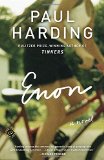Summary | Excerpt | Reading Guide | Reviews | Beyond the Book | Readalikes | Genres & Themes | Author Bio

The woman frowned and her face went slack and she slapped at the car door. She slicked her hair back and pointed her forefinger at me and dropped it.
"Oh, God," she said. "You'd better not be—Oh, God. Go; go."
I have remembered many times the sight of that woman in the rearview mirror, standing in the rain and looking at me, clearly unsure whether she'd been duped or I had told her the truth. That was the first thing I remember seeing as I was thinking, I had a daughter and she died.
The mortician who took care of Kate's funeral was the son of my grandparents' next-door neighbors. On the day Susan and I went to make arrangements for Kate's cremation and funeral, he wore a charcoal gray suit. He had close-cropped, receding hair that had turned mostly white over the course of the four times I had met with him in my life: when my grandfather died, when my grandmother died, when my mother died, and now when my daughter died. He smelled faintly antiseptic. He held his hand out and I shook it. His hands were very soft and clean, as if he regularly scrubbed them with pumice. His nails were manicured.
"Hello, Susan, Charlie," he said. "Come right into the office. Would you like anything to drink, coffee, spring water?"
"No, thank you, Rick." I was embarrassed to call him Rick. The family had always referred to him as Ricky, as if he were still a little kid, the son of the neighbors, Ricky Junior. I didn't know what name he went by as an adult. It occurred to me that I had no idea what name I'd called him when my mother had died, which was the first time I had dealt with him directly, as the person making all the decisions about services and burial. When my grandfather had died, my grandmother had made the arrangements, and when she had died, my mother had done so, calling Rick Ricky, I remembered clearly, but as one adult speaking familiarly and affectionately to another with whom she had shared some of her childhood.
"Please, sit," he said, waving his hand at a burgundy-colored leather sofa. Susan and I sat.
"We have taken care of everything. I just need to ask you about an urn, and if you could bring us something loosefitting and comfortable for Kate to wear, pajamas or something similar, for the cremation."
Susan said, "She liked to sleep in a T-shirt and cotton pajama pants—I don't know what you call them. Ha, they're those things the kids wear to bed but to school, too, if you let them." "Yes, yes, I know all about those. Lounge pants." I didn't know whether Rick was married or if he had children. There was a gold wedding band on his left ring finger. If he had children, they'd be my age. So, I reasoned, if he knew about kids wearing pajama bottoms and fleece slippers to school, it would be because he had grandchildren Kate's age or even older. I nodded. I had no idea what to say. Susan continued.
"And the slippers, too. Fleece-lined, open-back things. She tried to wear those to school, too." Kate's favorite clothes to sleep in had been a white pair of pajama pants with different flowers and their Latin names written under them in black, and a thin, soft T-shirt silk-screened with the word supergirl on it, both of which I knew must be on the floor next to her bed, because she'd been wearing them the night before she died, when she'd come downstairs to use the bathroom between three and four in the morning while I was watching a late Red Sox game. She'd have changed out of the pants and shirt and into her bathing suit and denim cutoffs and bright green, short-sleeved polo shirt, the clothes in which she'd died, it occurred to me, and in which she must still be dressed, unless the morticians had removed them.
"Can she wear the slippers, too? Can we get her slippers?" Susan asked. "We'll go get the clothes right now."
Excerpted from Enon by Paul Harding. Copyright © 2013 by Paul Harding. Excerpted by permission of Random House. All rights reserved. No part of this excerpt may be reproduced or reprinted without permission in writing from the publisher.
Your guide toexceptional books
BookBrowse seeks out and recommends the best in contemporary fiction and nonfiction—books that not only engage and entertain but also deepen our understanding of ourselves and the world around us.